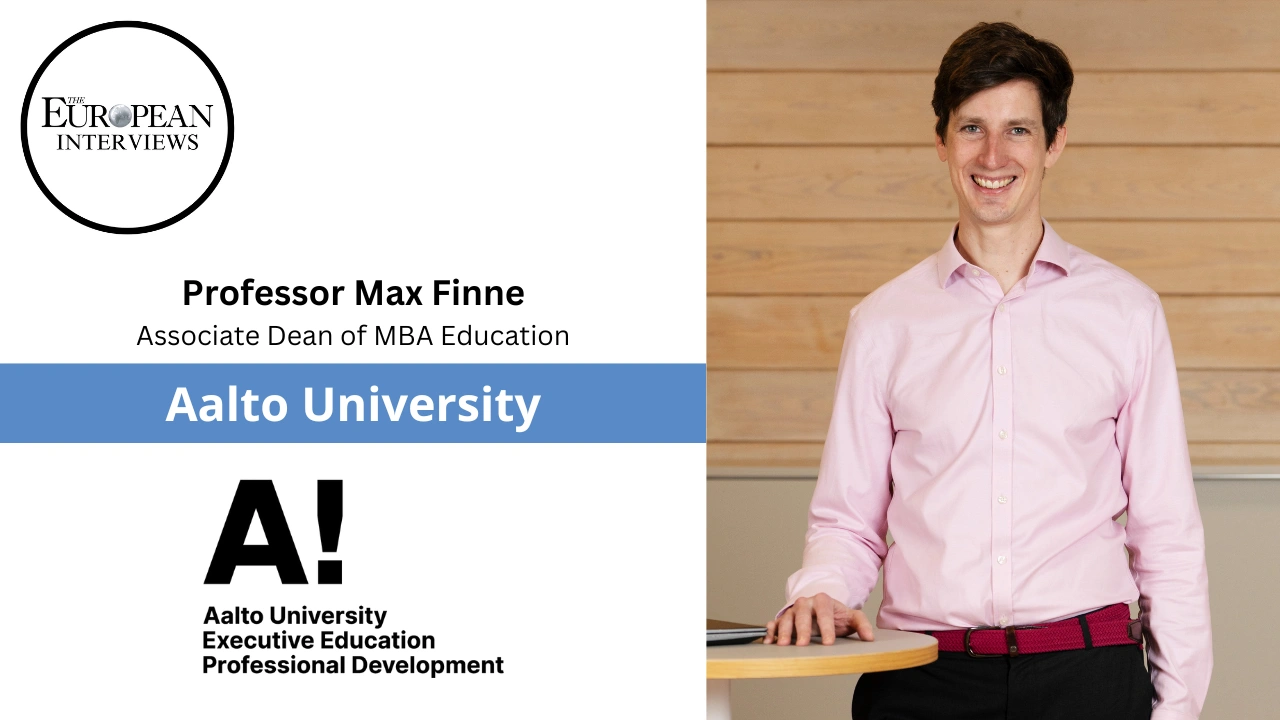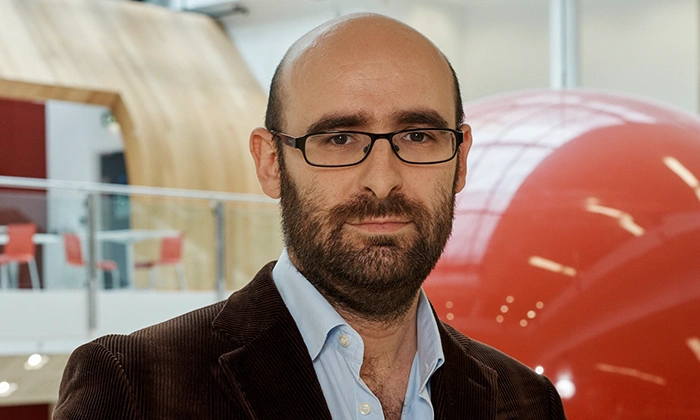MBAs enter the blockchain era

John E. Kaye
- Published
- Executive Education

When Professor Campbell Harvey included a lecture on cryptocurrencies and blockchain in his international finance course at Fuqua School of Business, Durham, North Carolina, US, he immediately fell in love with the subject. “I was talking about the dollar the euro, the yen, the pound, [so] why not do cryptocurrencies?
And as I began reading about the scientific basis for cryptocurrencies, I became very, very impressed,” he says. He ended up spending more time preparing the lecture on cryptocurrencies than on the rest of the course.
What started as a simple lecture soon turned into a full-fledged course on blockchain and cryptocurrencies, one of the first academic courses on a subject that was, back then, obscure and even controversial. Harvey’s class is now one of the most popular modules for MBA students at Duke University’s business school, with 231 students picking it in its fourth consecutive year, more than three times the number last year. As Harvey recalls, he started with just 13 MBA students.
This is a fast-moving subject area. Something new happens every month, from an innovative initial coin offering (ICO) to a new twist to “smart contracts” powered by the blockchain. To help his students keep up with the latest trends in the industry, Harvey invites influential people from the blockchain community to share their knowledge via videoconference. Names of speakers so far include ConsenSys’ Joe Lubin, Amber Baldet of JP Morgan’s blockchain initiative and Fred Ehrsam, co-founder of the cryptocurrency exchange Coinbase.
But even Harvey finds it difficult to cope with the pace of change in the industry. When he finishes teaching, he has to start preparing almost immediately for the next term; around half of the content previously taught gets scrapped. “In this space, the amount of turnover of material is dramatic. I am accustomed to preparing lectures on the fly in the middle of the course. It requires an enormous amount of work,” he says.
Business schools go tech
Professor Harvey’s course is not a rarity in the MBA industry anymore. As the blockchain has gone mainstream, with hundreds of different uses from the financial sector to healthcare emerging over the last few years, business schools have rushed to incorporate it into their programmes. Although demand for the traditional MBA has dropped to historically low levels, interest in blockchain-themed courses is constantly growing, both from MBA students and employers looking for graduates with knowledge of this new technology. As many as four applicants vied for each slot at a blockchain class launched recently at Haas School of Business, University of California, Berkeley, US. Even a maximum “bid” (MBA students at Haas bid for elective courses with a fixed budget) was not enough to ensure admission into the class, says one of the course’s instructors, Professor Gregory La Blanc.
Interest in financial careers waned in the aftermath of the financial crisis, according to La Blanc, but the number of financial technology (fintech) startups rapidly took off. “Many of our MBAs, prospective MBAs and alumni, as well as members of our faculty became interested in what came to be known as fintech. Now even students interested in more traditional finance careers realise that they need to learn more about technology and new forms of organisations, markets and technologies.”
Employers are chasing students who can help them harness the blockchain’s disruptive power. The majority of Harvey’s students are hired by firms wondering how to deal with it. A grasp of its current and future business applications is what they are looking for, he says: “They’re not looking for someone to code up some blockchain, they’re looking for somebody to identify the opportunities where they can potentially be the disruptor rather than sitting around and being disrupted.”
A big challenge for business schools is to recruit people who can teach the subject.
Blockchain experts are a rare breed, and usually run their own startups or are paid six figure salaries by banks. “There is a huge shortage
of qualified faculty members,” says Professor David Yermack, Finance Department Chair at New York University’s Stern School of Business. He is optimistic that the problem will remedy itself as PhD students who specialise in the blockchain start filling up the academic market. “What I have been trying to do is to convince some younger faculty members to learn about this and make an investment in their human capital. It’s likely they will teach it whether they like it or not, so you almost have to learn about it if you are a young professor,” he says.
Yermack launched his own course on digital currencies at Stern in 2014, driven by a combination of curiosity and a sense that technology was posing new questions in financial compliance. His class started with 30 students and focused on bitcoin, the only game in town back then. Today the class has 200 students and has been renamed to cover other cryptocurrencies that have become competitors to bitcoin, as well as new areas such as intellectual property, identity and verification. It is just one of the various fintech courses available at Stern, where an increasing number of students graduate with a specialisation in the subject.
Managing change
For many business schools, the biggest challenge is to mix students, academic staff and curricula that come from two different worlds: business and technology. Combining these two different ways of thinking at institutions with long-established hierarchies and cultures is not always easy. “Usually the resistance to interdisciplinarity comes not from the students but from the institutions,” says La Blanc.
The best way to overcome this challenge is to get people to work together, says Fuqua’s Professor Harvey: “My student groups have
a mix of backgrounds. When planning their startup idea, they deal with the clash of culture between tech and non-tech within their group.” Mixing up the students helps them empathise with the other side. Students with a tech background appreciate the value of skills like competitive strategy and the importance of having a viable business model. As for students from other areas, they might have a idea for a new business, but it may not be technically feasible. “I believe that it is crucial for a successful startup to have diversity of backgrounds on the management team and a type of culture that is open to contributions from managers from all backgrounds,” says Harvey. His course has a rare interdisciplinary designation, allowing him to teach a tech component, as well as traditional business content that spans finance, marketing, strategy, decision sciences and accounting.
La Blanc’s class at Berkeley is also designed to be cross-disciplinary. Seats are equally apportioned to MBA students, law students and engineers, while the instructors come from three different schools. “It has become apparent that engineers lacking finance training have taken the lead in many of these initiatives and there is a realisation that an understanding of both tech and finance is a winning combination,” says La Blanc.
He sees his own course as a part of a broader movement at Berkeley and beyond to encourage more innovative approaches to teaching. The school recently introduced a joint undergraduate business and engineering programme, as well as courses designed to teach management to engineers and technology to managers. Data science courses have also become available to all Berkeley students. Demand comes from the bottom up, La Blanc says: “Students want to view things from multiple perspectives. They want to be able to switch back and forth between inductive and deductive approaches. They are no longer content to take things on faith and rely entirely on experts from other fields.”
RECENT ARTICLES
-
 Hannu Tihinen on strategy, leadership, and the value of an EMBA
Hannu Tihinen on strategy, leadership, and the value of an EMBA -
 European MBAs adapt to AI as Aalto overhauls executive education
European MBAs adapt to AI as Aalto overhauls executive education -
 From dialogue to action: how emba X prepares leaders for a new era of responsible innovation
From dialogue to action: how emba X prepares leaders for a new era of responsible innovation -
 How Europe can learn faster: turning AI into safer, smarter adult training
How Europe can learn faster: turning AI into safer, smarter adult training -
 Aalto EE launches Aalto Tech EMBA to equip executives for digital transformation
Aalto EE launches Aalto Tech EMBA to equip executives for digital transformation -
 Supply chains are being remade. Leadership must be too
Supply chains are being remade. Leadership must be too -
 Why the real barrier to AI success sits in the boardroom
Why the real barrier to AI success sits in the boardroom -
 ETH Zurich and the University of St.Gallen redefine executive education with emba X, a new model of responsible leadership
ETH Zurich and the University of St.Gallen redefine executive education with emba X, a new model of responsible leadership -
 Why leadership is the strongest defence in South Africa’s schools
Why leadership is the strongest defence in South Africa’s schools -
 Porto Business School launches executive programme on AI strategy
Porto Business School launches executive programme on AI strategy -
 POLIMI Graduate School of Management strengthens global reputation in MBA and master’s rankings
POLIMI Graduate School of Management strengthens global reputation in MBA and master’s rankings -
 Trinity Business School strengthens standing in global MBA rankings
Trinity Business School strengthens standing in global MBA rankings -
 Meet the class of 2025… and their children. Why mid-life university learning is on the rise
Meet the class of 2025… and their children. Why mid-life university learning is on the rise -
 University of Michigan launches executive programme for chief data and AI officers
University of Michigan launches executive programme for chief data and AI officers -
 International education: A vision for global citizens
International education: A vision for global citizens -
 How to create lasting social change? Build a community
How to create lasting social change? Build a community -
 Tomorrow’s world needs Dyslexic Thinking
Tomorrow’s world needs Dyslexic Thinking -
 Why family therapy is the best investment you can ever make
Why family therapy is the best investment you can ever make -
 How EQ can give us the edge over AI
How EQ can give us the edge over AI -
 A true root and branch approach
A true root and branch approach -
 It's fine to say you're not ok
It's fine to say you're not ok -
 Are you willing to change with your organisation?
Are you willing to change with your organisation? -
 Emerging markets: Online learning for women unlocks economic potential
Emerging markets: Online learning for women unlocks economic potential -
 A programme of urgent importance
A programme of urgent importance -
 Why progress is not parity
Why progress is not parity



























